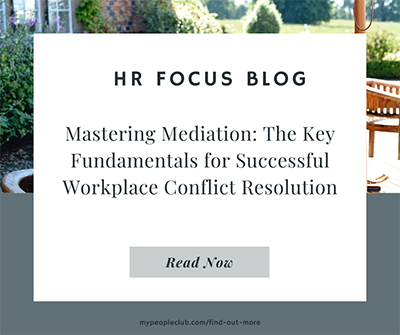As HR professionals, we are naturally the ones people approach when they have a conflict. I don’t know about you, but I’ve felt like the referee many a time in the meetings, issues, disputes in the workplace. Now, don’t get me wrong there have been far too many professional moaners I’ve come across in my time, you know those who just like to go against the grain for the fun of it. But when it comes to serious disputes, well that’s where mediation as a tool comes into play.
Mediation for me an important skill for HR pros to develop pretty early on in your career, it is an effective way to resolve workplace conflicts, and having a solid understanding of the fundamentals is important for success. Here are some of the key fundamentals I’ve picked up along the way for you to keep in mind:
Understanding what Mediation is: Mediation is a voluntary and confidential process where a neutral third-party mediator helps parties in conflict to work towards a mutually agreeable resolution. It is not about determining who is right or wrong, but about finding a solution that works for everyone.
As a mediator you should be neutral, impartial, and experienced. Being well-versed in the process, and able to build trust and rapport with all parties will ensure a successful outcome.
Before starting any mediation process, it’s important to prepare (it’s in our DNA). Your planning should involve setting clear objectives and identifying ALL the key issues that need to be addressed. It’s also important to set expectations to everyone involved, share the mediation process with everyone, outline what their role is in it, and what they can expect. Trust me this is time well spent and will help make it so much easier in the long run.
The process itself will typically begin with an opening statement from the mediator, followed by each party having the opportunity to present their perspective on the conflict. As the mediator you will then facilitate a discussion between the parties, helping them to explore and understand each other’s perspectives and interests. Helping the parties to work towards finding a mutually agreeable solution.
If the parties are able to reach a resolution, you will help them to formalise the agreement. If a resolution is not reached, the parties have an option to continue the mediation process or pursue other forms of dispute resolution.
As with many HR processes maintaining confidentiality for all parties is critical in mediation. All parties must agree to keep the details of the process and any agreements reached confidential. This helps to build trust and promotes open communication between the parties, which will help to bring a successful outcome for all.
Mediation is an effective tool to use to resolve conflicts in the workplace and done well can help build trusting relationships between colleagues.

